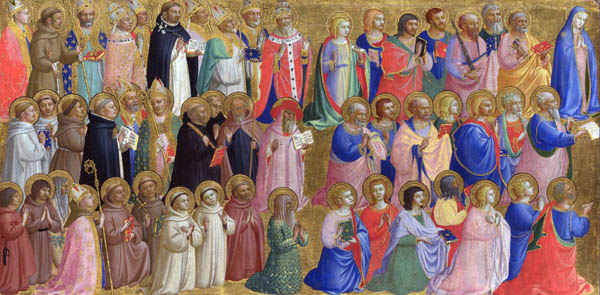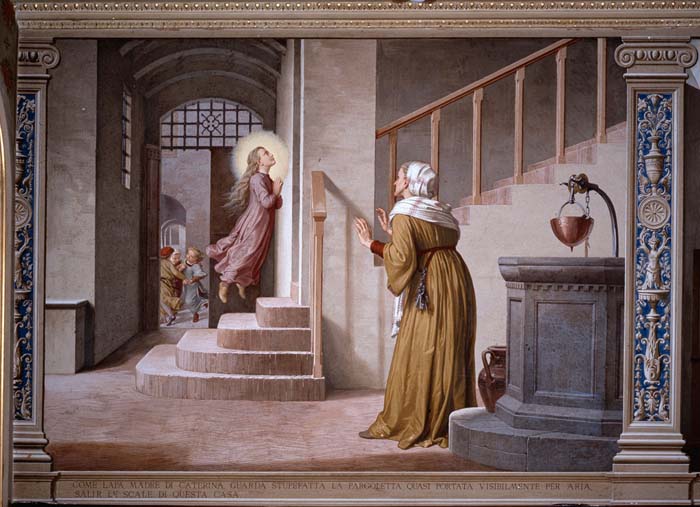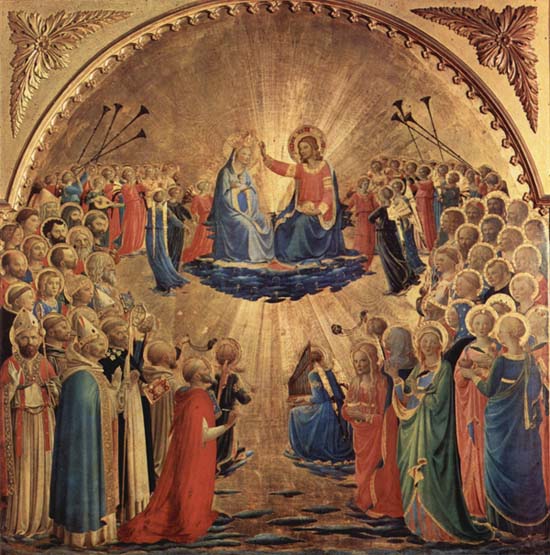

When Pope Pius VII was a prisoner in France, he made a vow that if he were delivered, he would place a crown of gold on the statue of Our Lady of Loreto. He was freed, and fulfilled his vow with great solemnity on May 13, 1814. He saluted Mary as "Queen of All Saints."
St. Aelred has a tribute to Our Lady that is like a poem: "The Spouse of Our Lord is surely Our Lady; the Spouse of Our King is surely Our Queen." The title "Queen of All Saints" ought to have a special appeal to us all, for it is by this title that She is, in anticipation, our very own Queen, since, by the grace of God, we hope to be numbered among the saints in Heaven one day. Hidden saints, hidden to the world, but known to God and Mary. We used to have in the Seminary an old priest who made much of the Feast of All Saints. "It is your feast," he would say, "the only feast you will ever have." No, we shall probably not be canonized martyrs, or confessors, or virgins—but we hope to be of that "great multitude, which no man could number, of all nations, and tribes, and peoples, and tongues, standing before the throne, and in sight of the Lamb, clothed with white robes, and palms in their hands" (Apoc. 7: 9).
The first in that throng of created beings, angels or men, is Mary, so immeasurably above them all that She is, as it were, a distinct creation. St. Anselm says: "O Lady, nothing equals Thee: for all is either above Thee, and this is God alone, or beneath Thee, and this is all that is not God." We have already discussed in many places Mary's holiness, that supremacy of sanctity which is greater than the holiness of all the angels and saints taken together. It is that holiness, given to Her because She is the Mother of God, which makes Her Queen of All Saints, the immeasurably greatest of all the saints. That is the prime meaning of the title, the proclamation of Her personal holiness. The secondary meaning has a very special interest for us. It is that the saints in Heaven regard Her and venerate Her as their Queen, not only because of Her dignity as Mother of God and Her personal sanctity, but because, if they are saints at all, they owe it, after God, to Her intercession. We have but to recall what we said before about Mary being our Mediatrix, that all graces given to men are dispersed by God through Her hands. Even those who do not know Her, those who ignore Her, belittle Her in their ignorance, receive whatever actual graces they get through Her hands. More so because She is not a mere instrument, but our Intercessor, "our Life, our Sweetness, and our Hope." The saints know that well enough. They did not have to reach Heaven to discover that. They realized it on earth, and that is why they are in Heaven today. The saints have been Mary's greatest glorifiers. Their sanctity began when they recognized Her supreme sanctity. St. Teresa of Avila, for example, set out on the high road to sanctity the day she chose Mary for her Mother after her own earthly mother had died. The Little Flower abandoned herself to sanctity that day when as a child, thought to be dying, she begged Our Lady to have pity on her, and Our Lady answered Her by smiling upon Her. "The expression of Our Lady's face was ineffably sweet, tender and compassionate; but what touched me to the very depths of my soul was Her glorious smile."
 St. Catherine of Siena was a saint, when as a child of seven she climbed the stairs in the Benincasa house and stopped on every step to say an Ave. But why go on? In the life of every saint you will find a solid devotion to the Mother of God. You will never find any mawkish sentimentality in the writings of the saints. They are too level-headed for that. Their feet are firmly set upon the ground, even though their heads are above the clouds and their souls swimming in ecstasy. Sometimes their speech is beyond us to comprehend. We poor earthlings cannot follow St. Teresa of Avila or St. Peter of Alcantara in their deep mysticism, but they are solidly Catholic in their theology, solidly Catholic in their devotion to Our Lady. The language they use in speaking about Her is the simple language we all know. That is one of the marks of the Catholic, the common-sense way in which he speaks about the Mother of God. The great spiritual writers have soared to celestial heights on wings of divine poetry, but the heart of their eulogies of Mary is the very same as the simple prayer of a child singing one of Fr. Faber's hymns to Her.
St. Catherine of Siena was a saint, when as a child of seven she climbed the stairs in the Benincasa house and stopped on every step to say an Ave. But why go on? In the life of every saint you will find a solid devotion to the Mother of God. You will never find any mawkish sentimentality in the writings of the saints. They are too level-headed for that. Their feet are firmly set upon the ground, even though their heads are above the clouds and their souls swimming in ecstasy. Sometimes their speech is beyond us to comprehend. We poor earthlings cannot follow St. Teresa of Avila or St. Peter of Alcantara in their deep mysticism, but they are solidly Catholic in their theology, solidly Catholic in their devotion to Our Lady. The language they use in speaking about Her is the simple language we all know. That is one of the marks of the Catholic, the common-sense way in which he speaks about the Mother of God. The great spiritual writers have soared to celestial heights on wings of divine poetry, but the heart of their eulogies of Mary is the very same as the simple prayer of a child singing one of Fr. Faber's hymns to Her.
The greater the saint, the greater his love for Mary. The greater the saint, the more he recognizes Her sanctity; and, conversely, the more he recognizes Her sanctity, the more inspiration he gets to pursue sanctity. St. Gertrude, a common sense saint, indeed, yet a deep mystic, knew that. We, too, can pray the prayers she prayed. There is one beautiful prayer of hers which we poor sinners can make our own, as well as she, the mystic:
O fairest Lily, Thou sweetest Mary, who art, after God, my greatest, surest hope, speak Thou on my behalf in the presence of Thy dear Son; speak for me but one effectual word. Plead my cause with all Thy loving devotedness; obtain for me in Thy goodness the object and aim of my desires; for in Thee do I trust, in Thee, who art, after Jesus, my one and only hope. Show Thyself towards me a Mother full of tenderness; obtain for me that I be received by Our Lord into the hiding-place of His love, into that school wherein the Holy Ghost teacheth. For above all others canst Thou obtain for me this favor from Thy Divine Son. O Mother Most Faithful, surround Thy daughter with Thy thoughtful care, that I may become an ever-living fruit of love; that I may grow in all holiness, and that the dew of Heaven may uphold my perseverance.
 The whole of Mariology is in that prayer. St. Gertrude, as all the saints, knew that Mary is an expert in the making of saints, and hence her deep devotion to Her. It was the simplicity of childlike love, for the great saint is a simple saint, often speaking in loving exuberance. To them nothing was too good for the Mother of God. The last words the Little Flower wrote were these: "O Mary, were I Queen of Heaven, and wert Thou Thérèse, I should wish to be Thérèse, that I might see Thee Queen of Heaven"— a thought modeled after the one of St. Augustine: "O God, if I were God and Thou wert Augustine, I would wish to be Augustine, that Thou mightest be God." Exaggeration, you may say, but at the heart of the two expressions is overwhelming love that will not be curbed by words.
The whole of Mariology is in that prayer. St. Gertrude, as all the saints, knew that Mary is an expert in the making of saints, and hence her deep devotion to Her. It was the simplicity of childlike love, for the great saint is a simple saint, often speaking in loving exuberance. To them nothing was too good for the Mother of God. The last words the Little Flower wrote were these: "O Mary, were I Queen of Heaven, and wert Thou Thérèse, I should wish to be Thérèse, that I might see Thee Queen of Heaven"— a thought modeled after the one of St. Augustine: "O God, if I were God and Thou wert Augustine, I would wish to be Augustine, that Thou mightest be God." Exaggeration, you may say, but at the heart of the two expressions is overwhelming love that will not be curbed by words.
And if the saints while on earth loved Mary so much, what must their love and gratitude be to Her now when they are beholding Her in Heaven. We have little idea of what blessedness it is to see God face to face. "Eye hath not seen, ear hath not heard." Nor can we appreciate the blessedness of seeing the glorified Mother of God. Our Lady has appeared many times on earth since Her Assumption, but "beautiful Lady" that She was to St. Bernadette and others, the vision was necessarily tempered to their earthly eyes. They could not have seen Her as She is and lived. On the authority of many saints, we could not gaze upon the beauty of a soul in the state of grace and live. Now the saints see Her in Heaven. When we say that, we can say no more, for it is beyond us to visualize what they see. It is all summed up by St. Albert the Great, when he says: "Mary could not be more closely united to God without becoming God." It is an inspiration to us, who hope to be joined to that host of saints one day.
Meanwhile we are on our way. We are, please God, saints in the making. "Thy sons shall come from afar, and thy daughters shall rise up at thy side" (Is. 60). We all want to save our souls, and thus be saints finally. We all want to go home. And the beauty of it is that we know how to get there. Not only does our Mother keep a light in the window to show the way, but She comes to get us, to take us by the hand and lead us—rather She carries us. She hears us when we sing, in the Ave Maris Stella, “Show Thyself a Mother;" in the Memorare, "O Virgin of virgins, our Mother;" in the Salve Regina, "Mother of Mercy." The more we love Her, the more we pray to Her; the more She loves us, the more She prays for us.
Our sorrow is that we do not love Her more. Fr. Faber says: "There can be no repentance in Heaven, else when we see Mary we shall wish we had known Her better, prayed to Her more often, and loved Her more; for we shall see brighter places than our own, further forward in the glory of Heaven, where we might have been had we loved Her more!"
So our souls are filled with new zeal, new determination to win at last the place that is prepared for us at the foot of the throne of the Queen of All Saints.
Contact us: smr@salvemariaregina.info
Visit also: www.marienfried.com